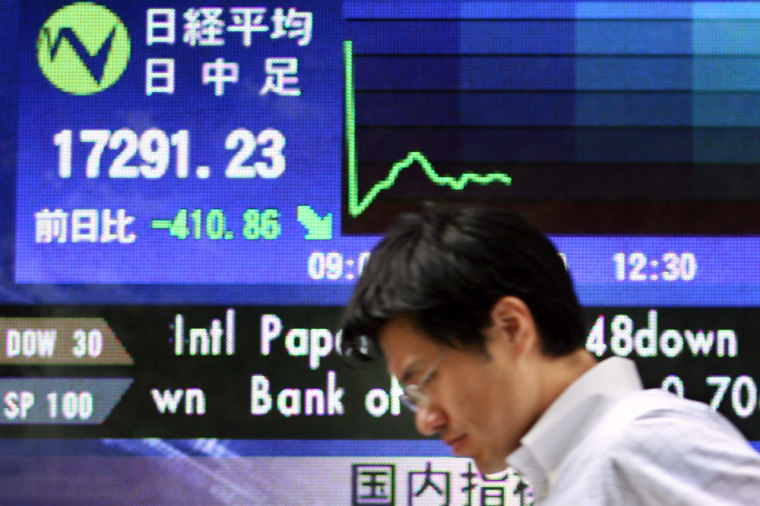Stock markets around the world slid on Friday, echoing a plunge a day earlier in the United States as fears about a widening crisis in the U.S. economy proved contagious from Tokyo to London.
Europe’s major market gauges turned lower after starting the day on a positive note. Germany’s benchmark DAX-30 Index fell 1.2 percent to 7,417.46, well off its record highs of only a few days ago. In Paris, the CAC-40 was down nearly three-fourths of a percent to 5,633.54 while in London, the FTSE 1000 was down more than half a percent to 6,215.40.
“Traders are well and truly worried over the U.S. credit issues, whilst mixed earnings data are adding to the general level of concern,” CMC Markets’ Matt Buckland said of the aversion that European and Asian markets were showing in light of U.S. concerns.
Investment house and financial services firm USB said that the risk aversion levels were reaching levels last seen in September 2001.
Earlier in Asia, Japanese stocks fell to nearly three-month lows, Philippine stocks marked their steepest decline in 10 years, and South Korea’s benchmark index — which had hit a record Wednesday — sank 4.1 percent, its biggest slide in more than three years.
Chinese stocks, however, ended the day little changed. The benchmark Shanghai Composite Index slipped just 0.03 percent after hitting an all-time record high on Thursday.
The concern over market volatility caused drinks producer Cadbury Schweppes PLC to extend its deadline for bids on its U.S. beverage unit, which includes key brands like 7-UP, Dr Pepper and Snapple.
U.S. stocks plunged Thursday amid mounting concerns that sluggish home sales and continued defaults in subprime loans would spur debt defaults and weigh on corporate earnings. The Dow Jones industrial average sank 311.50 points, or 2.26 percent, to 13,473.57, its biggest point drop since Feb. 27, when a drop in the Shanghai market sparked a global rout.
Investors also worried that higher corporate borrowing costs will curb the rapid pace of takeovers that had driven stocks higher this year. Global liquidity could dry up as international investors pull out of riskier assets, including Asian emerging markets, analysts said.
“If big foreign funds have selling orders, they tend to go by region. If they sell Asia funds, they do it to reevaluate portfolios or cover losses in the U.S.,” said Rommel Macapagal, chairman of Westlink Global Equities, in Manila.
“But for local investors, it’s a sentiment. When big drops occur, they tend to get jittery because of expectation of foreign funds selling. They tend to get out,” he said.
In Tokyo, the Nikkei 225 index sank 418.28 points, or 2.36 percent, to close at 17,283.81 — nearly a three-month low. Concerns about the yen’s recent strength, which hurts exporters, and uncertainty over weekend parliamentary elections also weighed on the Japanese market.
The sell-offs in Asia came after stunning rallies in the region — markets in South Korea, China and India hit records just this week — and some investors viewed Wall Street’s drop as a good opportunity to sell and lock in their profits.
Hong Kong’s Hang Seng index fell 2.8 percent, while stocks in the Philippines tumbled 3.9 percent, their biggest drop since 1997. Taiwan’s benchmark index fell even more, dropping 4.2 percent. Australia’s benchmark index slid 2.8 percent, its biggest decline since 2001. In India, the 30-share Sensex of the Bombay Stock Exchange fell 542 points, or 3.4 percent, to 15,235.
